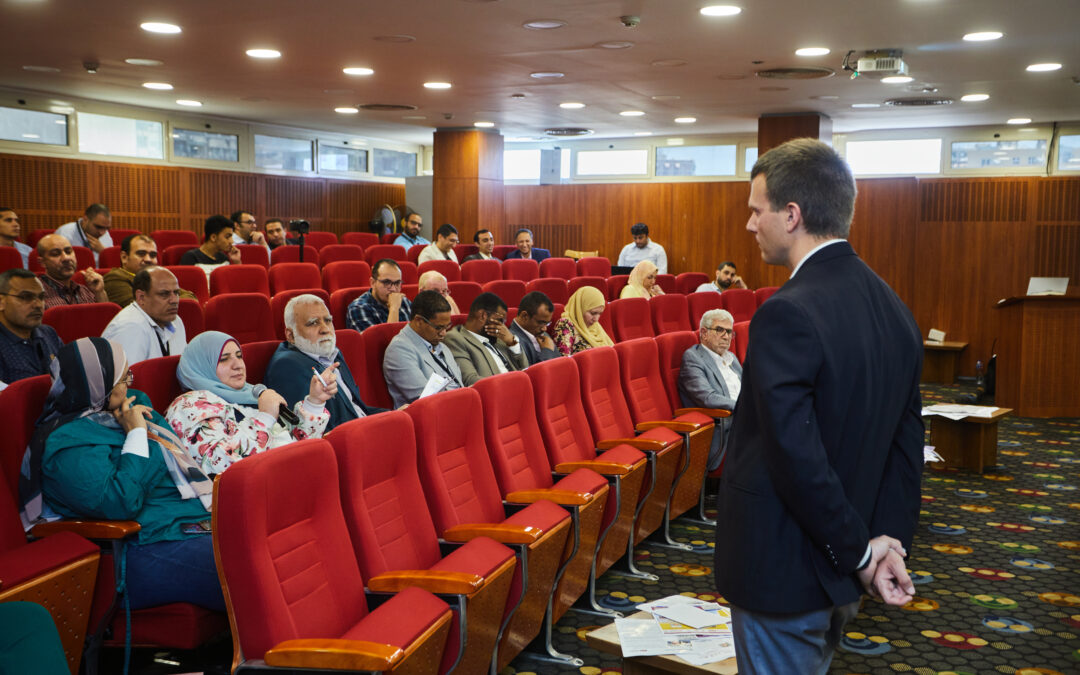Hosted by the Center of Excellence for Energy, the Innovative Teaching Methods assessment and workshop was conducted by Dr. Ryan Milcarek, assistant professor at Arizona State University who incorporates hands-on activities, real-world problem solving, and peer-led study groups in his engineering courses, and Dr. Gary Lichtenstein, founder of Quality Evaluation Designs and affiliate associate faculty at Rowan University who coaches engineering faculty on implementing active learning and inclusive teaching in their classrooms.
Funded with the support of the American people through the United State Agency for International Development (USAID), the Center of Excellence for Energy aims to support Egypt in reaching its target of 42% renewable energy by 2035. To do this, the center works closely with leadership and faculty at Egyptian partner universities, as well as in governmental agencies, non-governmental organizations, and the energy industry, to increase higher education capacity and promote innovation, competition, and modernization in Egypt’s energy sector.
“One of the key goals of the Center of Excellence for Energy is to further higher education capacity to meet the growing needs of the energy sector in Egypt,” says Dr. Sayfe Kiaei, project director and professor at Arizona State University. “To do this, we are developing and improving curriculum courses and modernizing laboratory spaces as well as hosting training programs like this to advance innovative and effective teaching methods with a more interactive approach. We appreciate the time and expertise Drs. Ryan and Gary put into conducting a comprehensive assessment and developing a training program for us.”
Commenced in April, the assessment will continue throughout the year with follow up seminars and trainings with a goal to advance innovative teaching methods in the energy engineering programs at the center’s Egyptian partner universities at Ain Shams, Mansoura, and Aswan, which the pair visited the first week in May. They met with faculty and teaching staff, conducted focus groups, held one-on-one sessions, and observed in classrooms.
“Students understand the concepts better when the content is taught with questions, problem solving, discussion, and interactions with the instructor and peers,” says Dr. Milcarek. “Over the years I have implemented many active learning strategies and have found it more rewarding to teach a class when students are actively commenting on the topics, and they also ask more in-depth questions which keeps the discussion going.”
On May 4, the two conducted a teaching methods workshop presenting strategies to incorporate active learning into classrooms, including immediate strategies in classroom practices, incremental strategies to adjust course assignments and assessments, structural strategies, and fundamental strategies to completely overhaul courses and program objectives.
“I think faculty are surprised to find how easy as well as effective active learning strategies can be to use,” says Dr. Lichtenstein. “At this workshop, many faculty learned that they are already using active learning techniques without being aware of it. The point is not to substitute lectures with active learning, but to mix it up. Mixing instructional strategies keeps students’ brains switched on.”
More than 50 teaching staff attended the Innovative Teaching Methods workshop. Most of the teaching staff that attended were very satisfied with the outcome and would attend another workshop like this. Of the attendees who filled out a post-workshop survey, about 89% said the workshop addressed the challenges of motivating and engaging students in the learning process well.
“I already apply many of the mentioned teaching methods and find them very effective in enhancing my classes and promoting students’ engagement,” says Dr Doaa Anas El-Molla, associate professor at Ain Shams University who attended the workshop. “The workshop helped me to get some new ideas that I plan to implement in my courses. For example, I think that I will use the brain dump and guided notes techniques next semester in my courses and add more assignments that have a real project or problem storyline.”
For more information on the workshop and to watch the video of the workshop, visit Center of Excellence for Energy.
The Center of Excellence for Energy is funded by USAID with the support of the American people with a goal to help Egypt reach its target of 42% renewable energy by 2035 and position the country as a regional leader in clean energy. The center is operated by Arizona State University in partnership with three Egyptian universities: Ain Shams, Mansoura, and Aswan.
The U.S. Agency for International Development administers the U.S. foreign assistance program providing economic and humanitarian assistance in more than 80 countries worldwide.
# # #
